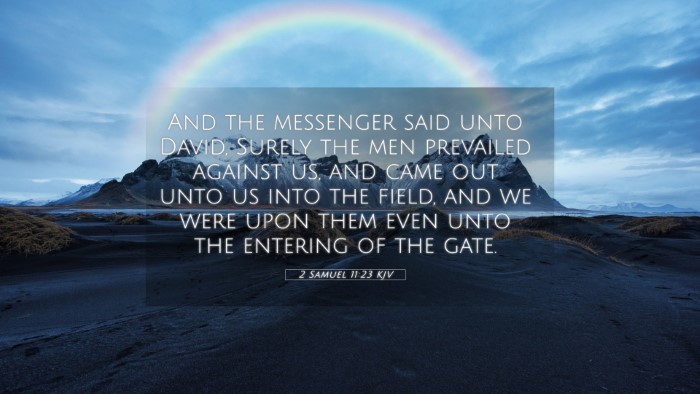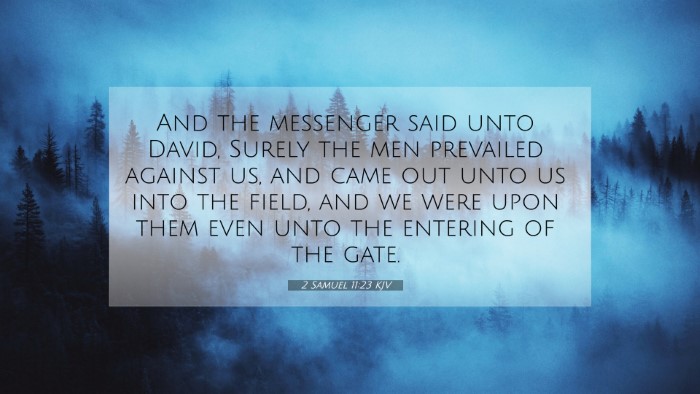Understanding 2 Samuel 11:23
2 Samuel 11:23 offers a poignant reflection on the consequences of actions and the ripple effects of decisions made. By combining insights from renowned public domain commentaries such as those by Matthew Henry, Albert Barnes, and Adam Clarke, we can dig deeper into the layered meanings of this verse.
Verse Context
In this chapter, King David's decision to involve himself in the sin of adultery with Bathsheba leads to a tragic sequence of events. The context of this verse is crucial for understanding its implications. David's military commander, Joab, communicates the outcome of the battle against the Ammonites, emphasizing the stakes involved in this moral and military dilemma.
Verse Analysis
- Matthew Henry's Commentary:
Henry notes that when Joab reports the battle's outcome, he provides not only the details of casualties but also a reminder of Uriah’s death, which reflects David’s original intent and the moral consequences that followed. Joab’s direct mention serves as a reminder of the intimate and devastating impact of David's sin.
- Albert Barnes' Notes:
Barnes underscores the futility of David's schemes as he attempts to cover his wrongdoing. The report to David illustrates the harsh reality that sin often leads to further complications, affecting not just the sinner but those around them. Barnes emphasizes the callousness of the report as it notes Uriah’s death with a clinical detachment, highlighting the severity of moral failure.
- Adam Clarke's Commentary:
Clarke discusses the severity of the situation and how the meanings of the events unfold with grave consequences. He suggests that the report was both factual and a commentary on the dark nature of David’s actions. The way Joab phrases his message indicates a deeper awareness of the moral implications at play.
Key Themes and Connections
This verse provides rich opportunities for thematic Bible verse connections and comparative studies. Here are some essential themes explored:
- The Consequences of Sin: The cascading effects of David’s adultery and the subsequent murder of Uriah reveal how closely intertwined moral choices are with their consequences.
- Leadership and Responsibility: David, as king, bears ultimate responsibility for his actions, illustrating that leadership comes with profound moral obligations.
- God's Judgment: The theme of divine justice and the inevitable repercussions of sin thread throughout the story, leading to David's eventual confession and confrontation with Nathan the prophet.
Cross-References
When studying 2 Samuel 11:23, several other scripture passages offer valuable insights and thematic parallels. Here are some notable cross-references:
- 2 Samuel 12:9-10: Nathan’s confrontation and the divine commentary on David’s sin.
- Matthew 5:27-28: Jesus’ teachings on adultery, extending the discussion of sin into the moral fiber of intentions.
- Galatians 6:7: The principle of reaping what one sows in the context of sin and its consequences.
- Proverbs 28:13: The necessity of confession and the dangers of concealing one’s sins.
- 1 Corinthians 10:12-13: The warning against pride which opens the door to temptation.
- James 1:14-15: The process of desire leading to sin and ultimately, death.
- Psalm 51: David’s repentance and plea for mercy, following his sin with Bathsheba.
Conclusion
This in-depth analysis of 2 Samuel 11:23 reveals not only the immediate narrative implications but also the larger theological themes of sin, accountability, and the far-reaching consequences of our actions. Through cross-referencing with other Bible passages, readers can draw connections that enhance their understanding of scriptural teachings and the character of God.
By utilizing these insights and tools for Bible cross-referencing, readers can cultivate a richer understanding of the interconnectedness of scripture. This verse serves as a powerful reminder of the weight of our choices and the divine justice meted out in response to our actions.


